Aalto Open Science Award Ceremony, May 7, 2024
Join us in celebrating the winners of the Aalto Open Science Award 2023!
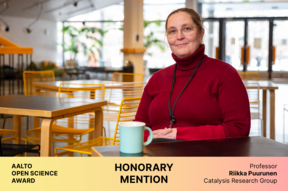
The research of Professor Riikka Puurunen, the Head of the Catalysis Research Group, is focused on catalysis and atomic layer deposition. Puurunen and her research group carefully manage their research data and provide open access to publications, data and code. Puurunen has also coordinated an extensive international open science project and shared her expertise in blog posts and videos. Her persistent effort towards advancing open science was recognised with an honorary mention in the Aalto University Open Science Award 2023.
The Catalysis Research group mainly focuses on two research areas, catalysis and atomic layer deposition (ALD). Professor Riikka Puurunen explains that catalysis has significantly impacted food production as it enables the transformation of nitrogen from the air into ammonia, which is used in the production of fertilizers. Catalysis is also involved in the purification of vehicle exhaust gases and plays a crucial role in climate change mitigation.
Professor Puurunen’s other main research topic is ALD, a material fabrication technology which was invented in Finland and the Soviet Union around the same time. ALD is a multifunctional tool, enabling many diverse applications in nanotechnology. Thin films produced by ALD can be utilised for example in microelectronics, solar cells, or as a layer protecting silver from tarnishing.
ALD was the subject of Professor Puurunen’s open science project, Virtual Project on the History of ALD (vph-ald.com). When Puurunen initiated the project, she didn’t yet realise that it was aligned with open science. It was motivated by the need to understand and document the history of her field of research. The project started as a group of four researchers in 2013 and eventually grew into a community of 72 participants gathering pieces of information into an openly accessible collection. All participants volunteered their time without pay to collaboratively map the early history of ALD. Puurunen presented the benefits of the open science approach recognised in the project at an ALD research symposium in her talk “Learnings from an open science effort: Virtual project on the history of ALD”. The links to information collected in the project are also a part of the open educational resource collection maintained by Puurunen on the Aalto OpenLearning platform (Course: Atomic Layer Deposition (ALD) (aalto.fi).
Professor Puurunen advances open science and education as a forerunner who tries to lead by example. She is an early adopter of open science practices, but she also approaches the matter with researcher’s critical thinking. Puurunen talks about sustainable open science, meaning open science practices that are useful to both society and the researcher in the long term. For example, opening research data for the sake of openness is not sustainable if the data are not well-documented and no one can understand and use them. Researchers’ time is a limited resource, and it is neither sustainable nor reasonable to put effort into everything possible. Sustainability of IT resources and energy usage should also be considered when we think about what data should be preserved in data repositories for decades.
A key factor in advancing open science would be that researchers understand the benefits it can bring to them. Puurunen recommends opening research data and code supporting results presented in research articles. Sharing the data and code makes it easier to validate the results, and this supports the quality and reliability of research. From a more selfish point of view, openly accessible data and code will also remain accessible to the author. This is especially useful for doctoral and post-doctoral researchers, who will likely move on to another organisation for their next position, and they might not be able to easily access the data collected at their previous institute.
Researchers are less likely to make their research outputs openly accessible, if they don’t think it’s beneficial for them and there is a lack of examples in their community. If they perceive their data and code as something that brings them competitive advantage, this can also prevent them from sharing it.
Good examples can, however, have great influence. Professor Puurunen’s research group found it easier to openly share their code after seeing how this was done by another researcher in their field. They continued to share what they learned in a video showing an example of how code can be published on GitHub, assigned a DOI via the integration with Zenodo, and accompanied with citation guidance. A dataset published by the Catalysis Research group is also used as an example of a dataset with well-documented metadata in the Aalto University’s data management planning workshops. (Training in Research Data Management and Open Science | Aalto University)
Publishing the manuscript of a research article in a preprint archive before it is accepted for publication in a journal is still relatively uncommon in the field of chemistry. Puurunen and her research group aim to openly share their manuscripts in ChemRxiv, a discipline-specific preprint platform for chemistry. However, it is also necessary to consider potential risks of open science practices. When sharing manuscripts, it is important to avoid such open licences which allow third parties to publish the article, such as the CC-BY licence. While the final version can be published in a journal with as permissive a licence as possible, the unpublished submitted manuscript should be protected from third party commercial use. In the worst-case scenario, the manuscript might not be accepted by any journal, because publishing on a commercial platform could be interpreted as prior publication.
There have been cases of commercial entities such as ResearchGate harvesting information from preprint archives and publishing the preprints on their own platform without permission from the researchers. Puurunen has also found her own preprints from ChemRxiv on ResearchGate, although they had been published with the CC-BY-NC-ND licence, which restricts commercial use. Only after a public request on X (formerly Twitter) the preprints were removed from ResearchGate. In cases like this, Puurunen would like to get support and help from Aalto University support services.
Professor Puurunen believes that open science can be advanced in small steps, and she hopes to see more grassroots level development. She also hopes that in the near future, efforts to foster open science will be considered in the evaluation of research and researchers. Puurunen thanks the Aalto University leadership for establishing the Open Science Award: it is good to give recognition and visibility to open science activities also at Aalto University.
Professor Puurunen has set up a Zenodo community, ALD saturation profile - open data, for publishing well-documented datasets and files openly.
Open Educational Resource on ALD by Puurunen. The course is accessible via guest access (no login required) or by logging in (see instructions through the link).
Professor Puurunen was one of the Aalto University researchers who participated in the UNITE! University alliance study of open science practices in research groups. The study included interviews with 70 research groups from different disciplines and the outcomes were published as a handbook of best practices: Vicente-Saez, R., Windeck, J., Ribeiro, M. H. L., Rousi, A., Rovira Fernandez, A., Legrand, A., Rodrigues, C., Halverson, K., & Cappelluti, F. (2023). Unite! handbook of best practices for effective mainstreaming of open science and innovation at Universities. Unite! Alliance Publications.
Puurunen's YouTube channel contains, for example, a live recording of the process of publishing Open Code to GitHub and Zenodo.org.
You will get to meet the winners and honorary mention recipient, Professor Puurunen, on May 7th on campus at the Open Science Award Ceremony. At the event, Puurunen will take part in a panel discussion on open science, and the audience will also get a chance to ask questions. The event is open to all and will wrap up with mingling over complimentary coffee and ice cream (non-dairy options available).
This interview is a part of a series showcasing the Aalto Open Science Award winner and runners-up. We warmly welcome you to the Open Science award ceremony which will take place on the 7th of May 2024.
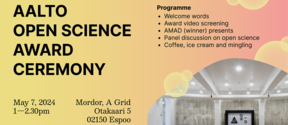
Join us in celebrating the winners of the Aalto Open Science Award 2023!
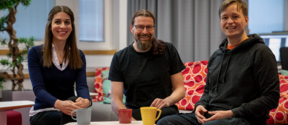
We interviewed the AMAD team, winners of the first Aalto Open Science Award.
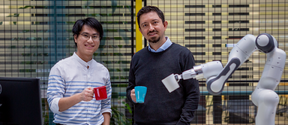
We interviewed the Intelligent Robotics Research Group with the Robotic Manipulation of Deformable Objects project, 3rd place awardees of the first Aalto Open Science Award.
The principle of openness is the key principle of science and research. At Aalto University, the most visible forms of open science are open access publications, open research data and metadata, and combining openness and commercialisation.
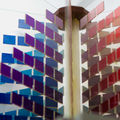
Properly managed research data creates competitive edge and is an important part of a high-quality research process. Here you will find links to support, services and instructions for research data management.
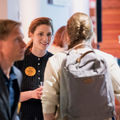
We offer free and open to all training in research data management and open science.
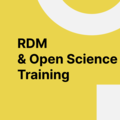
Data Agents are researchers who work to improve data management in their department, school, or unit.




